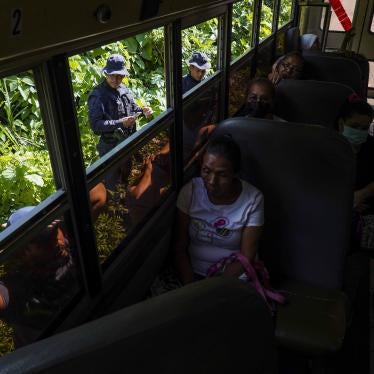(New York) - Human Rights Watch today wrote to Panamanian President Mireya Moscoso, urging her to deny political asylum to Vladimiro Montesinos, the former Peruvian spy chief. The former head of Peru's National Intelligence Service (Servicio de Inteligencia Nacional, SIN), arrived in Panama on Saturday night. The organization also called on the Panamanian justice authorities to investigate and prosecute Montesinos for grave violations of human rights, consistent with Panama's obligations under the United Nations Convention against Torture.
To claim victim status for Montesinos is nothing short of a farce," said José Miguel Vivanco, executive director of Human Rights Watch's Americas Division.
In its letter, Human Rights Watch pointed out that granting refuge to a public official credibly alleged to have committed grave violations of human rights in his country would contravene basic principles of asylum law, which expressly refuse the right of asylum to human rights violators. Indeed, under the Convention against Torture, to which Panama is a party, rather than extend its protection to such persons, the country is required to prosecute or extradite torturers found on its territory.
Montesinos has been alleged to be responsible for planning kidnappings and murders carried out by the Colina group, a death squad belonging to the SIN. Eight death squad members, who had been convicted and imprisoned for the abduction and murder of nine students and a teacher from La Cantuta university, were unconditionally released under a government amnesty in 1995. Montesinos may also be implicated in the torture in 1997 of former Army Intelligence agent Leonor la Rosa Bustamante, the torture and murder of fellow-agent Mariela Lucy Barreto Riofano, and the torture of journalist Fabian Salazar in May 2000. Each of these crimes was committed against people suspected of leaking information to the press about the SIN's illegal activities.
There has been no action in Peruvian courts against Montesinos for any of the crimes for which he is believed responsible, due in large part to the SIN's wide-ranging influence over the judiciary. A charge for corruption of a public official following last week's video scandal is expected to be dropped soon.
Human Rights Watch strongly criticised the United States government and the Organization of American States for putting pressure on Panama to receive Montesinos, after it had initially refused to do so. "In the long run, granting a safe haven to Montesinos will only reinforce impunity for human right violations in Peru," said Vivanco. "It is unacceptable for the U.S government and the OAS to compromise basic human rights principles in this way, and it is unfair to expect Panama to be a dustbin in which to toss the continent's rejected strongmen."






